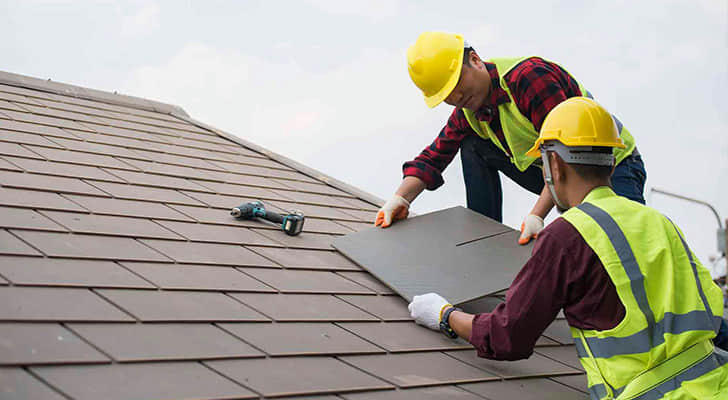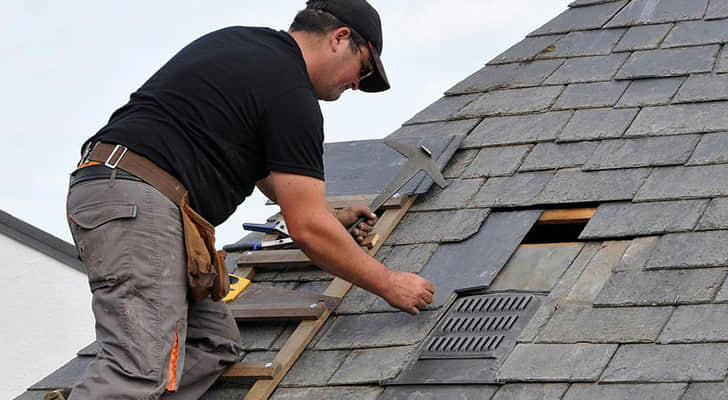Your Go-To Guide for Finding and Hiring a Roofing Repair Specialist
Looking to hire a roofing contractor but don't know where to start? Finding the right roofer for your project doesn't have to be a daunting task. Start by tapping into local resources—ask your neighbors or your Homeowner Association (HOA) for their top recommendations. Dive into roofing contractor directories and state requirements to make sure you're looking in the right places. And don't forget to check out reviews to gauge the reputation of potential candidates.
Once you've got a shortlist, reach out to a few local roofers to set up consultations. This is your chance to verify their credentials, scrutinize their reviews, and compare their quotes. By the end of this guide, you'll be well-equipped to choose the roofing contractor that best fits your project and budget.

When Should You Call a Roofing Contractor?
Your roof is like the crown of your home—it needs to be in top shape to protect the rest of the house. If you spot problems like leaks, cracks, or just signs of wear and tear, it's time to call a roofer. Addressing these issues promptly will prevent further damage and save you money in the long run. Ideally, you should start looking for a roofer before you're faced with a roofing emergency. Being proactive is always better than scrambling at the last minute.
Qualifications for Roofing Contractors
Roofing contractors must meet specific local requirements, so it's essential to do your homework. Check out your state's regulations and contractor directories before making a decision. A reputable roofer should:
-Have substantial experience in the field
-Hold a valid license for your area
-Be insured to cover potential accidents
-Be bonded, which provides financial protection if something goes wrong
-Offer to provide references from previous clients
-Be willing to give you a written estimate
What Services Do Roofers Offer?
Roofing services can vary widely, so it's important to ask what each contractor provides. Here's a rundown of common services you might encounter:
-Roof Inspections: Identifying issues like leaks or damage.
-Repairs and Maintenance: Fixing leaks, replacing damaged shingles, and performing regular upkeep.
-Installation or Replacement: Putting in new roofs or replacing old ones.
-Weatherproofing: Adding protective layers to fend off the elements.
-Insulating and Ventilating: Enhancing roof insulation and airflow.
-Snow and Ice Removal: Clearing snow and ice dams that could cause damage.
-Roof Cleaning: Removing mildew, moss, and buildup with pressure washing.
-Sealing and Painting: Treating and painting roofs, which is especially important for wood or metal.
-Debris Removal: Clearing away any leftover debris from the job site.
If you're also planning to upgrade your gutters, siding, or windows, some roofers offer these services too. Handling multiple upgrades at once can be cost-effective since the contractor is already on-site.

Types of Roofing Contractors
Understanding the different types of roofing contractors can help you make an informed decision:
-Residential Roofing Contractors: Focus on homes, handling new installations and repairs. Though residential roofing is generally less complex than commercial roofing, it's crucial to choose a contractor with a solid track record to ensure your roof will last for years.
-Roof Repair Contractors: Specialize in fixing existing roofs, addressing issues like broken shingles, leaks, and other structural problems. They may also offer additional services like gutter cleaning.
-Roof Replacement Contractors: Experts in replacing roofing materials. They help you choose new materials and ensure a seamless transition from your old roof to the new one.
Choosing the Right Roofing Contractor
When it's time to hire a roofer, you'll need to decide between independent contractors and roofing companies. Each has its own set of advantages:
-Independent Roofing Contractors: Ideal for smaller, quick fixes. They often work alone or with a few subcontractors, which might make larger projects take longer. However, you get a personal touch since you'll work directly with the same individual throughout the project.
-Roofing Companies: Typically better for larger jobs and offer benefits like manufacturer warranties, discounts, and a broader range of materials. They have teams that can complete projects more quickly but you might not have a consistent contact person throughout the job.
Questions to Ask a Roofer
Before making your final choice, it's important to ask the right questions to ensure you're hiring the best person for the job.

-What types of roofing do you specialize in?
-Can you assist with filing insurance claims?
-Are you licensed to work in my area?
-What insurance coverage do you carry?
-Can you provide references from previous clients?
-Do you offer a free on-site inspection?
-Will you document the inspection and the finished project with photos?
-Can you provide a written estimate after the inspection?
-Do you handle roofing repairs? What are the costs?
-Is your work covered by a warranty?
-How do you manage project schedules, and what's your policy on bad weather?
-Will you handle the disposal of old roofing materials? Is there a charge, and do you recycle?
-How do you handle billing? Do you accept credit cards or offer financing?
Making Your Decision
Before choosing a roofing contractor, gather multiple bids to compare options. You might go for the middle bid or opt for the contractor with the lowest price if their availability fits your schedule. If your budget allows, you might choose the roofer with the highest estimate, especially if they have extensive experience with the roofing type you need.
Ensure that the roofer you choose has the necessary qualifications and experience. If you have specific roofing needs, such as unique materials or styles, be aware that your options might be limited. Most roofers handle common materials like asphalt shingles, but fewer are experienced with specialty options like cedar shakes or solar shingles. Be cautious of door-to-door bids, particularly from contractors who show up after storms. Always verify their credentials and references before agreeing to any work.
